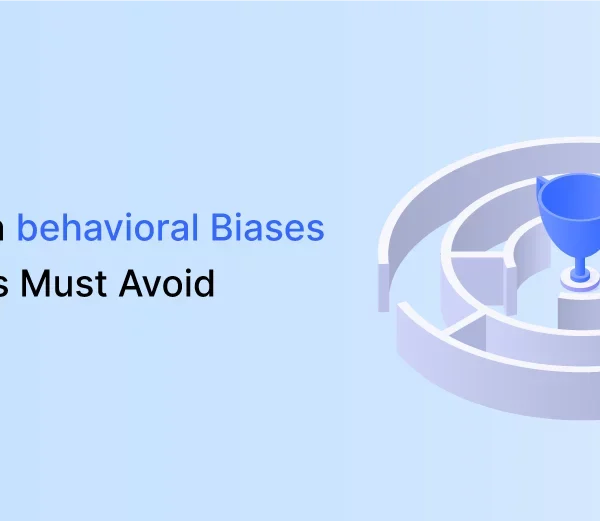Investing has gained much momentum since young adults understood that money will only depreciate in their savings accounts.
In these times of rising inflation, stock markets have been instrumental in providing returns that beat inflation. However, investing in the stock market requires proper knowledge and understanding.
Mutual funds are an excellent option for investors looking for wealth creation and appreciation. As per the ‘Consumer Spending Outlook 2022’ report by LocalCircles that was published in the Times of India, 40% of people were likely to invest in equities and mutual funds.
But still, some people are afraid of investing in mutual funds. Let’s understand the reasons and break the ice about investing in mutual funds.
Top Reasons Why People Are Afraid of Investing in Mutual Funds
Here are some of the top reasons why people are afraid of investing in mutual funds:
- Risk Factor: There is a risk factor associated with mutual fund investments. As the funds are invested in market instruments, they carry certain stock market risks like volatility, fall in share prices etc., which deters us from investing in mutual funds. As we don’t want to lose money, we often let it stagnate in our savings accounts.
- Past Setbacks: We might have previously lost money in the stock market, which might make us anxious about investing in mutual funds. The records of stockbrokers who went bankrupt because of poor management or bad decisions might also deter us from investing in mutual funds.
- High Expense Ratios: Mutual funds involve an expense ratio. This expense ratio directly reduces the returns of the unit holder. The expense ratio signifies the expenses associated with the management and administration of the funds.
- Poor Knowledge: Many of us are still afraid of investing in mutual funds because we lack financial knowledge. We won’t lie here; mutual fund investments need a bit of financial understanding. However, many of us are reluctant to invest time in learning about financial markets or receiving guidance on investment decisions from professional fund managers.
- Market Volatility: Stock markets are volatile, especially in the short term. At any time, multiple factors, such as demand and supply, geopolitics, global economic conditions, and government policies, influence stock market investing. Disciplined investment plans can help deal with market volatility.
- Poor Performance: Sometimes, we might see one or two underperformed schemes and end up generalizing the returns of all the mutual fund schemes. Not all stocks perform the same way. Similarly, some mutual funds provide exponential returns. Some might provide moderate returns, while others will give below-market returns.
Why Should We Invest in Mutual Funds?
Now that we know why some of us are not sure about investing in mutual funds, it is time to check how much of the fear holds. Here are a few top reasons why we should invest in mutual funds.
- Diversification: Mutual funds are far less risky as compared to stocks. While the funds collected by the mutual fund companies are ultimately invested in the stocks, it is important to know that a mutual fund diversifies our money into multiple stocks and thus reduces the overall investment risk.
- Multiple Options: There are endless investment options regarding mutual funds. This often confuses investors with the selection of funds. A good solution is to determine our investment goal and risk appetite. If our goal is to generate income, we can invest in dividend-yielding funds. If we want to accumulate wealth, then we could choose growth funds. If we have a low-risk appetite, we can go for large-cap funds.
- Liquidity: Many investors think that mutual funds are not liquid and are afraid of investing. However, this is not the case. Most mutual funds are open-ended so that we can sell our mutual fund units anytime. They are as liquid as equity shares; therefore, our money is not locked in after investments.
- Tax Benefits: Apart from being an investment tool, mutual fund investment can also help us with our tax planning. The Income Tax Act of 1961 allows a maximum deduction of Rs. 1.50 lakh per financial year under Section 80C under the Equity Linked Savings Scheme (ELSS). However, it requires a lock-in period of 3 years or the deduction would be reversed.
- Professional Management: Mutual funds are professionally managed by expert fund managers, who use their expertise and experience to help investors gain maximum returns. This makes mutual fund schemes an ideal investment tool even for amateur stock market investors.
In a Nutshell
The more we hold your investments, the more time they will have to grow and compound. There is a growing awareness among young adults about smart investment options.
Millennials are no longer hesitant about hiring financial advisors, as it helps them make better decisions in the long run.
Young investors are actively interested in finding the right investment avenue that matches their goals. Mutual funds are one of the few instruments that can fit almost every investor’s needs.
Mutual fund investments have the ability to diversify our assets Koshex provides a dedicated investment platform that allows us to invest in some of the best mutual fund schemes that suit our investment strategy and risk appetite.
Further, it also allows us to invest in smart, fixed, and digital gold. Multiple options, one platform – when are you investing?
Disclaimer: Mutual fund investing is subject to market risk. Please read all scheme-related documents carefully.
Frequently Asked Questions
Q: What are the different ways we can invest in mutual funds?
A: We can invest in mutual funds through the following ways:
- Demat Account: That’s the Koshex way! We need to open an online Demat account with any of the financial service providers or stock brokers. Once completed, we can begin our investment journey.
- An account with AMC: Here, we need to open an account with the Asset Management Company or the fund we want to invest in. One of the drawbacks is that we would be able to invest in only those funds offered by these AMCs.
- Mutual Fund Agent or Distributor: We can invest through a mutual fund agent or distributor. They act as financial advisor and guides us through the selection of the scheme and complete the process of getting onboard. However, the expense ratio is enormous when we go with mutual fund agents or distributors. This is because mutual fund companies pay hefty commissions to them that directly reduce our returns.
Q: Are mutual fund investments safe?
A: Yes. Mutual fund investments are regulated by the Securities and Exchange Board of India (SEBI), which acts as a watchdog of securities and financial markets. Therefore, it is safe to invest in mutual funds.









Leave a Comment